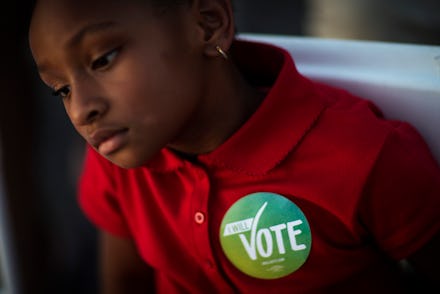Think Your Vote Doesn't Matter? These 4 Charts Prove You're Wrong

The news: The 2014 midterm election looks set to have the lowest voter turnout in years, but that's not the only concerning trend: If patterns from past elections hold up, November's polls are going to have a rather big turnout gap between the rich and the poor, as well.
In a recent post on Demos, researcher Sean McElwee tackled the thorny subject, illustrating that the voting and nonvoting public have very different economic makeups.
According to his data, 99% of the top 1% of wealthy Americans voted in 2008, while only 49% of Americans earning less than $10,000 did the same. But it gets even worse in the midterm elections (like those coming up). In 2010, though the number of rich voters (defined as those making over $150,000) dropped to 61.6%, the number of Americans making less than $10,000 dropped to a paltry 26.7%.
In other words, according to McElwee, voter turnout is heavily biased toward the wealthy.
1. Here is voter turnout by household income (2008-2012)
Richer groups are more likely to be well-represented in any given election, and this trend is projected to continue this year.
2. There are big differences between what the voting and nonvoting public want.
Namely, the nonvoting public tends to lean more to the left.
3. The segment of population that doesn't turn up to vote wants bigger government.
Again, while this group may not show up to participate in voting, they generally prefer bigger government roles and programs.
4. If more nonvoters showed up at the polls, the U.S. political system is likely to turn bluer.
"Such a bias should be impossible to sustain — a Republican could easily win by moving slightly to the left of his opponent. However, given that the population that votes is significantly more conservative than those who do not, it's unsurprising. Politicians respond to voters, not nonvoters," McElwee explains in a write-up for Talking Points Memo.
What does this mean? McElwee's findings indicate that economically disadvantaged individuals aren't necessarily less politically informed or motivated; rather, they are experiencing more barriers to voting than the wealthy. McElwee suggests eliminating voter ID laws and working to boost voter registration and turnout, opening up the process to more people and allowing the results to more accurately reflect what the country wants.
"Fewer than 50% of people in the lowest income bracket vote, and it is increasingly clear that voting gaps of this magnitude are a significant factor in biasing public policy against a large majority of Americans, which includes large numbers of low-income households, and in favor of the comparatively tiny group consisting of the most affluent households," McElwee wrote. "Thus, closing voting gaps is significant not only for strengthening the integrity of our electoral system but for achieving a democracy that improves the lives of all Americans, not just the affluent."
The most heard voices in the American political system right now might belong to the wealthy. So if you want more people to participate in this democracy and for the results to better reflect the general populace's desires, arbitrary barriers to entry must be removed.
h/t Huffington Post